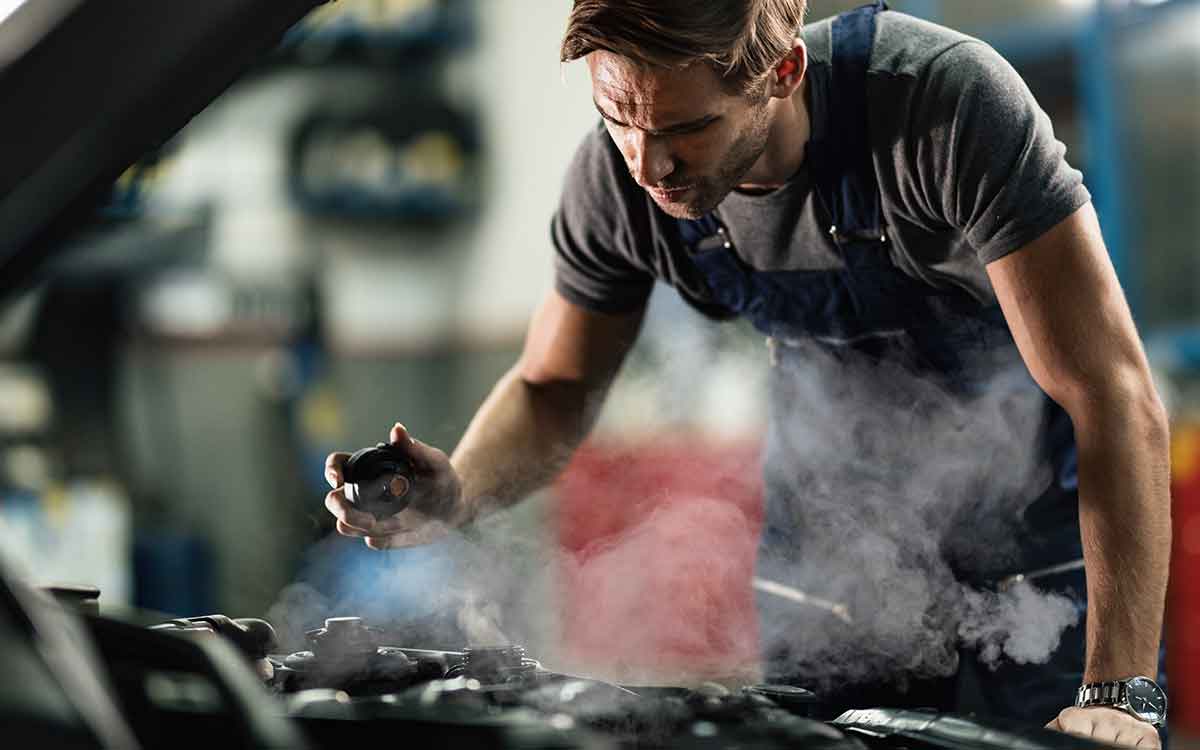If you’ve ever been driving down the road and your car has started to overheat, you may have considered pouring water on your engine to cool it down. This is a common practice, but is it effective?
In this article, we will explore the pros and cons of using water to cool an overheated engine. We will also discuss some of the dangers of doing this and provide some tips for avoiding overheating in the future.
So, can I pour water on my engine to col it down? I would say no, and here’s why. Pouring water on a hot engine can cause thermal shock, which is when the rapid change in temperature causes materials to crack or shatter. This means that pouring cold water on a hot engine can lead to damage such as cracked engine blocks, damaged cylinder heads, or even warped metal components. Additionally, the sudden injection of water can also cause electrical components to short circuit, leaving you with a hefty repair bill.
But wait, doesn’t water have a high heat capacity, making it an ideal coolant? While this is true, the key word here is “coolant.” Water works best as a coolant when it’s circulated through the engine via a radiator. Pouring it directly on the hot engine does not allow for proper circulation and can actually cause more harm than good. Furthermore, water is a conductor of electricity, meaning that it can potentially damage electrical components if it comes into direct contact with them.
Keep reading to find out more about why you shouldn’t pour cold water on a heated engine.
Cons of pouring water on my engine to cool it down
While there are some benefits to using water to cool your engine, there are also some risks involved.
1. Thermal shock:
The first reason why you shouldn’t pour water on your engine is because of thermal shock. This occurs when there is a sudden change in temperature, causing materials to expand or contract at different rates. When cold water is poured onto a hot engine, the sudden drop in temperature can cause parts like the engine block or cylinder head to crack or shatter.
I was watching a TV show where they showed a stuntman pouring water on his car’s engine to cool it down after performing a high-speed chase scene. While it may have looked cool, this is definitely not something you should try at home.
2. Electrical damage:
As mentioned earlier, water is a conductor of electricity. This means that if it comes into contact with electrical components in your engine, it can cause damage or even a short circuit. This is especially dangerous because it can lead to fires and other serious accidents.
Modern cars are equipped with a lot of electronic components that control various systems such as the ignition, fuel injection, and emissions. Pouring water on these components can cause expensive damage and potentially leave you stranded on the side of the road.
3. Dilution
One of the biggest dangers of pouring water on your engine is that it can dilute the engine oil. This can lead to decreased lubrication and increased wear on the engine parts. When you pour water on your engine, there is a high chance that it will enter the crankcase through the dipstick tube. This can cause the engine oil to become diluted and less effective at lubricating the engine.
The dipstick is an important tool for assessing the oil level in your vehicle and for checking the oil’s condition. It is often used to check the engine’s lubricating system and will indicate whether there is too much or too little oil in your vehicle. So by exposing water there is a high risk of damaging your engine so it is important to check the oil level often.
4. Corrosion
Another risk of using water to cool your engine is that it can cause corrosion. This is because water contains dissolved minerals that can be left behind when it evaporates. These minerals can cause corrosion on engine parts, which can lead to expensive repairs. Metal parts, such as the radiator and hoses, can start to corrode if water is not changed out regularly. Additionally, some types of antifreeze protectors contain chemicals that can damage engine components if ingested. To help prevent corrosion in your engine, use only distilled water when filling it up with coolant. Although distilled water may cost more than regular tap water,
5. Boiling
One of the most dangerous risks of pouring water on your engine is that it can boil. This is because water has a lower boiling point than coolant and will vaporize quickly when heated.
If the water boils, it can cause steam to build up inside the engine. This can lead to an explosion if the pressure gets too high.
6. Overheating
One of the most common problems with using water to cool your engine is that it can cause the engine to overheat. This is because water has a lower heat capacity than coolant and will not absorb as much heat.
This can lead to even more serious overheating problems and may even cause the engine to seize.
Pouring water on your overheated engine can be both beneficial and risky. It all depends on the severity of the overheating and how you go about it.
Whilst it is not recommended to use water in order to clean a car engine, there are some situations where it can be useful. For instance, if the engine has been left exposed to rain or water splashing from a nearby puddle, it is necessary to wash away any dirt or debris that may have accumulated on the surface. Furthermore, it can be useful for cooling down an overheated engine during an emergency situation
Tips for avoiding overheating
There are a few things you can do to avoid overheating in the first place.
1. Check your coolant level regularly
One of the best ways to avoid overheating is to check your coolant level regularly. This will help you to identify any leaks in the system and top up the fluid if necessary. You should check your coolant level at least once a month to also avoid overheating.
2. Check for leaks
Another way to prevent overheating is to check for leaks in the cooling system. This can be done by inspecting the hoses and looking for any signs of coolant leaking out. If you find a leak, it’s important to get it fixed as soon as possible. Leaks can cause the coolant level to drop, which can lead to overheating.
3. Inspect the cooling system
It’s also a good idea to inspect the cooling system regularly. This includes checking the radiator, hoses, and water pump for any signs of wear or damage. If you find any problems, it’s important to get them fixed before they cause more serious damage.
4. Change the coolant
Another way to prevent overheating is to change the coolant regularly. This will help to remove any contaminants that could cause problems. Coolant should be changed every two years or so. I would also suggest using a 50/50 mix of water and coolant to help prevent overheating.
5. Use the right coolant
It’s also important to use the right coolant in your car. using the wrong coolant can lead to corrosion and other problems. Make sure you consult your owner’s manual to find out what type of coolant is best for your car. Coolants are specially designed to protect parts from overheating and corrosion, so it’s important to use the right one. Be sure you follow all directions when changing your coolant; never mix different types of coolant, as this can cause problems. Additionally, be sure to change your coolant at least every two years. An old or contaminated coolant can damage your car’s engine and reduce its performance.
6. Turn on the heater
One of the first things you should do if your car starts to overheat is to turn on the heater. This will help to remove some of the heat from the engine. This is because the heater uses the engine’s coolant to heat up the cabin.
7. Pull over and turn off the engine
If your car is overheating, it’s important to pull over and turn off the engine as soon as possible. This will help to prevent further damage. Once you’ve turned off the engine, it’s a good idea to open the hood to help the engine cool down.
Try and avoid touching the metal components of the engine. It is highly important to wear protective gloves when handling any electrical or mechanical parts of your vehicle. Also, make sure you disconnect all power sources before beginning any project—this will keep you and your vehicle safe.
8. Turn off the air conditioner
Another thing you can do is to turn off the air conditioner. This will help to reduce the load on the engine and help it to cool down more quickly. the air conditioner puts a lot of strain on the engine, so it’s best to turn it off if your car starts to overheat. Air conditioner also reduces the fuel economy of your car, so it’s best to turn it off completely if you’re not using it. You can also reduce drag on your engine by removing any extra weight from the vehicle and ensuring that all components are in good condition. This will help your engine get back up to temperature faster and use less fuel in the process.
9. Avoid idling
One of the worst things you can do for your engine is to idle for long periods. This can cause the engine to overheat and can lead to serious damage because when you keep your car idle, the engine is not getting enough coolant.
10. Don’t race the engine
Racing the engine can also cause the car to overheat. This is because when you race the engine, it puts a lot of strain on the cooling system. If you’re going to be driving fast, it’s best to do it in short bursts rather than long periods of time.
11. Call a tow truck
Finally, If your car has overheated, it’s important to call a tow truck. This is because overheating can cause serious damage to the engine. If you’re not sure how to fix the problem, it’s best to leave it to a professional.
These are just a few tips that can help to prevent your car from overheating. If you have any other tips, feel free to share them in the comments below. Thanks for reading!
Final Thought
So Can I Pour Water on My Engine to Cool It Down? It all depends on the severity of the overheating and how you go about it. If you’re stranded on the side of the road with an overheated engine, pouring water on it may be your only option.
However, if you have access to coolant, it’s always best to use that instead. Coolant is specifically designed to cool your engine and won’t cause the same problems as water.
If you do use water to cool your engine, be sure to check the oil level and look for signs of corrosion. If you notice any problems, have your car checked by a professional as soon as possible.
Thanks for reading and I hope this article was helpful!

